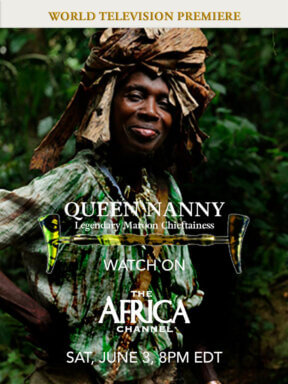Jamaica’s Maroons & only female hero scores national TV spotlight

June, the midyear month of the year’s summer solstice is revered with pride by brides, graduates, Black music lovers, and a myriad of other notables.
However, to immigrants from the Caribbean, it is the anticipated time-frame to boast the region’s history, heritage and culture.
Much of the braggadocio likely emanates from diasporans eager to display the uniqueness of each of the 20 CARICOM and associate member nations but this year the Africa Channel is in the forefront of media to spotlight Jamaica’s resilient anti-colonial warriors.
On June 17, the cable TV channel will air “Akwantu: The Journey” a feature film that documents a specific resistance movement, which established a stronghold in the Cockpit Mountains of Jamaica and triumphed as Maroons.
According to Roy T. Anderson, the director, producer and actor of the first of a series of enlightening features about his beloved island, the title is derived from the Ghanaian Akan interpretation of the English word ‘journey.’
Jamaicans should “tell stories about our struggles and the heroes,” he said.
Through an 87-minute journey, Anderson escorts audiences through a path from the dungeons of Ghana, across the Atlantic Ocean and the Middle Passages to Jamaica and the Accompong community which is now a curious and alluring attraction to tourists.
Viewers will be further enlightened when the credits roll later this month.
Not only did Anderson win wide acclaim on his first foray into the genre but he managed to fund a follow-up feature furthering his quest of documenting a second Jamaican narrative with the release of “Queen Nanny: African Cheftainess.”
The feature aired earlier this month, making its world premiere as the first of a double deal with the Africa channel.
Roy T. Anderson. Photo courtesy Action 4 Reel
Anderson said he is privileged by the opportunity to screen two documentaries about a little-known group of champions from the Caribbean.
Prior to the national and international showcase, Anderson’s films were primarily seen by limited audiences at film festivals, universities and private settings.
“You know it’s so gratifying to have my work available to a much wider audience than just in educational and community settings,” Anderson explained, “I’m really proud to be considered a cultural ambassador for Jamaica – the land of my birth.”
“That’s quite an honor.”
While enchantment finds “Queen Charlotte” the alluring, Black, British attraction to streaming television audience, Jamaica’s only undisputed monarch greeted a targeted audience and broadened the realm to reach a global demographic
“Everybody in Jamaica knows of the heroics of Nanny of the Maroons,” the filmmaker said.
Yet “outside of Jamaica, she remains a mystery, even though (I believe) she ranks above Black American icons like Harriet Tubman and Sojourner Truth.”
The blockbuster documentary entreated the cable channel’s 17 million viewing audience to an enlightening and compelling 59-minute presentation that debuted at the Schomburg Center for Research & Library in Harlem.
Filmed in Jamaica, Ghana, Canada, and the United States over the course of two years, the film about the warrior queen features appearances by the “Queen of Reggae” Rita Marley, the widow of Bob Marley; Jamaica’s first female Prime Minister, Portia Simpson-Miller; double Olympic and 5-time World Champion sprinter, Shelley-Ann Fraser-Pryce; U.S. Congresswoman Yvette Clarke; historians Verene Shepherd, Linda Heywood and others.
Anderson, himself a Maroon, gave the film a global introduction in 2015 when it premiered at the United Nations. That venue enabled discussion afterwards from delegates who represented numerous countries, dignitaries and celebrities.
Rita Marley joined the first audiences at the midtown Manhattan location and reportedly said she considered the film a testament to history, Jamaica and women.
The feature shed a bright light on the warrior woman who remains Jamaica’s only female – with seven male national heroes, Nanny stands alone as the heroine chieftainess.
Portrayed as a legend, Nanny was a real-life freedom fighter who beat the British at their own game.
She conquered.
Consider her prowess in the 18th century when she faced off against soldiers of the British Empire.
Her daring advances through the mountains and valleys of Jamaica is not unlike the treacherous treks Harriet Tubman maneuvered up-south as ‘conductor’ of the Underground Railroad.
Of the Caribbean Heritage Month screening Anderson said: “Some folks will be really surprised.”
Catch You On The Inside!




